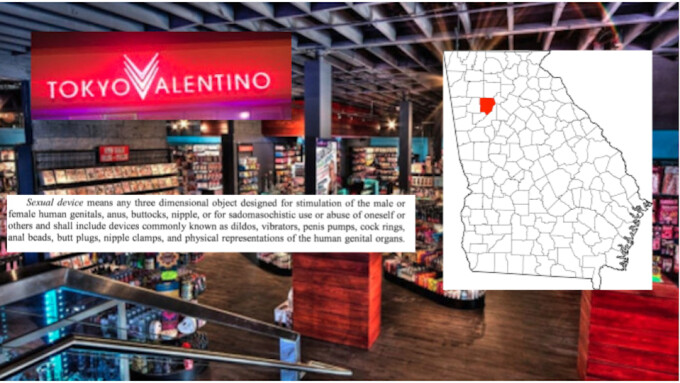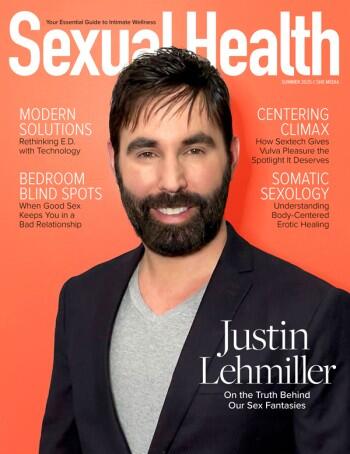EAST COBB, Georgia — In the latest attempt by Georgia municipal authorities to prevent adult boutique Tokyo Valentino from operating their existing stores, the Cobb Board of Commissioners has approved changes to the county code in order to target “sexually oriented businesses.”
The code amendments, reported local newspaper East Cobb News, “would limit sex shops and other adult businesses to two industrial zoning categories. All such businesses would be required to obtain a special license and employees would have to be issued a special permit.”
The changes, the East Cobb News reports, were directly and rapidly effected “after Tokyo Valentino, an Atlanta-based adult retail chain, opened a store on Johnson Ferry Road in the former Mattress Firm location across from Merchant’s Walk.”
Back in July, the Marietta City Council held a special meeting to decide if Tokyo Valentino could continue operating under the Georgia city’s zoning laws. After a rigged hearing — where the city lawyer responsible for the complaints against the store also acted the part of a judge — the City Council proceeded to suspend and revoke the license for 180 days and ordered Tokyo Valentino principal Michael Morrison to remove all items from the store.
The onslaught of municipal harassment against Tokyo Valentino in Georgia is being watched around the country as a bellwether for local moralists' strategies to restrict free access to sexual expression, education and products via regulatory and zoning issues.
The 'Secondary Effects' Argument
The new East Cobb regulations make continuous reference to alleged “deleterious [harmful] secondary effects of sexually oriented business,” based on the absurd notion that any business dealing with sex attracts criminal elements and therefore cannot be zoned near “proper,” law-abiding society.
Such a regulation has the effect of forcing any business dealing with sex to set up shop in areas with a higher crime rate, self-fulfilling the prophecy of the guardians of morality who associate sexually oriented businesses with a broad, panic-inducing laundry list of “secondary” crimes.
Here’s how the Cobb Board of Commissioners define these “secondary effects” that supposedly follow any business dealing with human sexuality: “personal and property crimes, human trafficking, prostitution, potential spread of disease, lewdness, public indecency, obscenity, illicit drug use and drug trafficking, negative impacts on surrounding property, urban blight, litter and sexual assault and exploitation.”
This ridiculous “secondary effects” argument is the only rationale given for the business-killing zoning changes.
Limiting, Restricting, Denying
The new amendments to the East Cobb code also preposterously claim that they “have neither the purpose nor effect of imposing a limitation or restriction on the content or reasonable access” to sexually oriented materials, and that “neither the intent nor effect” is to “deny access by adults to sexually oriented materials protected by the First Amendment, or to deny access by the distributors and exhibitors of sexually oriented entertainment to their intended market.”
Limiting, restricting and eventually denying access — by zoning lawful businesses out existence — to sexually oriented material and products is precisely what inspired these amendments, specifically targeting clean, well-lit boutiques like Tokyo Valentino.
Defining 'Sexual Device Store'
The new regulations also define terms like “adult arcade,” “adult bookstore,” “adult cabaret” and “adult motion picture theater,” and “sexual device shop” [sic] and establish the percentage of floor space devoted to certain items in order to define the “principal business activity” of the store.
The new regulations, following in a long-standing, bizarre tradition of local moralists, take very specific glee in defining terms such as “nudity,” “semi-nudity” and “sexual device.”
“Sexual device,” the Cobb Board of Commissioners in Georgia has decided, means “any three dimensional object designed for stimulation of the male and female human genitals, anus, buttocks, nipple or for sadomasochistic use or abuse of oneself or others and shall include devices commonly known as dildos, vibrators, penis pumps, cock rings, anal beads, butt plugs, nipple clamps and physical representations of human genital organs.”
If “more than 100 sexual devices are regularly made available for sale or rental [sic]” or “sexual devices are regularly made available for sale or rental [sic] and the establishment gives special prominence to sexual devices,” then the establishment will be considered a “sexual device shop.”
One of the business activities of “prominence” is “hosting events focused on sexual devices,” explicitly including sexual health informational seminars.
The regulations also create a “sexually oriented business license” and a “sexually oriented business employee permit.”
The license requirements seem written specifically to discriminate against Tokyo Valentino and existing adult businesses, specifically mentioning previous “orders of closure” and court proceedings that most adult boutiques would have racked up in their ongoing fights against local censors.
The zoning requirements also restrict “sexually oriented businesses” to a handful of desolate locations, establishing that they cannot be located within: 750 feet of a residential zoning district; 1,500 feet of a church, school, governmentally owned or operated building, library, civic center, public park, hospital, community club or prison; 1,000 feet of another sexually oriented business; or 500 feet of any store licensed to sell alcohol.

'Explicit Mobile Sign'
Daniel White, the local moralist who started an online petition against Tokyo Valentino which led to the code change, sent a statement to the Commissioners explaining his views about adult boutiques.
White claimed to be submitting his statement “on behalf of the 2,906 people who have signed the Change.org petition to reject the sex shop on Johnson Ferry.”
White was particularly troubled by Tokyo Valentino’s signage and decor. “Since the shop has opened it has installed outdoor color changing strobe like dance lights on the front and parked a large explicit mobile sign in front as well,” he wrote. “We are certain that these ‘near-legal tactics’ will continue. The sexually oriented permanent sign is tragedy to the progress we have made in the awareness of sexualizing and exploiting women. It’s tasteless and taunting.”
The “explicit mobile sign” in question featured a 1940s pinup style drawing of a model wearing a chaste, World War II-era black bikini.
“It is naive and insulting to say that opponents of this ordinance are 'just a bunch of moms,'" White continued. “Because it is not a bunch of ‘moms’ that keep these places open and frequent them enough to stay open. It is people who go often. It’s the rule of any business and if you’re in a sex shop often you don’t need to be 3/10’s of a mile from a school or within a few hundred yards of kids walking to school, a Chick-fil-A or a Starbucks or for that matter directly across the street from an Old Navy.”
Back in May in an Editor’s Note titled "Is East Cobb Really Uptight About a Sex Shop," the East Cobb News’ Wendy Parker said that news of the store’s opening had “stoked fury from some East Cobb citizens.”
“But do they speak for the entire community?” Parker wondered. “While many of us come here for safe neighborhoods, good schools and a family-oriented way of life, who’s to say there’s not a market for an adult store?”
Yesterday, the Cobb Board of Commissioners took a serious, anti-business step to prevent the town from ever finding an answer to that question.








